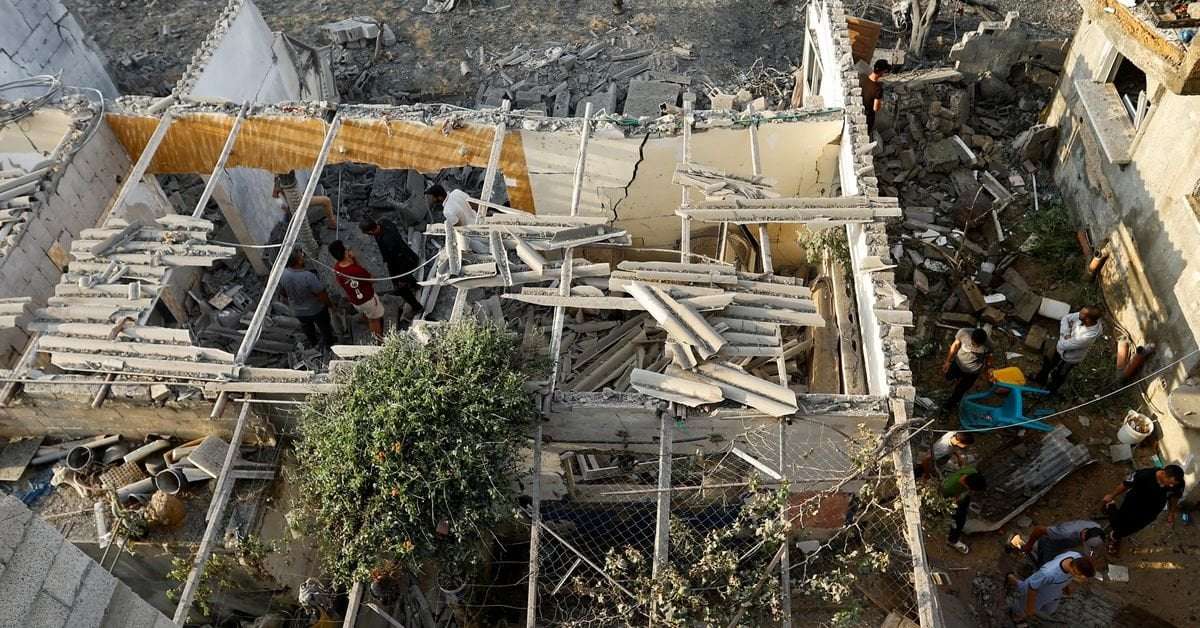Palestinians inspect damages of a house hit by Israeli strikes, in Khan Younis in the southern Gaza Strip October 11, 2023. REUTERS/Ibraheem Abu Mustafa Acquire Licensing Rights
Summary Aid would be delivered under limited ceasefire
U.S. said safe passage for civilians was under discussion
Gaza-Egypt crossing closed after Israeli strikes
CAIRO, Oct 11 (Reuters) - Egypt has discussed plans with the United States and others to provide humanitarian aid through its border with Gaza Strip but rejects any move to set up safe corridors for refugees fleeing the enclave, Egyptian security sources said on Wednesday.
Gaza, a tiny coastal strip of land wedged between Israel in the north and east and Egypt to the southwest, is home to some 2.3 million people who have been living under a blockade since Palestinian Islamist group Hamas took control there in 2007.
Egypt has long restricted the flow of Gazans on to its territory, even during the fiercest conflicts.
Cairo, a frequent mediator between Israel and the Palestinians, always insists the two sides resolve conflicts within their borders, saying this the only way Palestinians can secure their right to statehood.
U.S. National Security Advisor Jake Sullivan said the U.S. had been holding consultations with Israel and Egypt about the idea of a safe passage for civilians from Gaza, which was hit by a massive Israeli assault in response to a deadly incursion by Hamas fighters into Israel. Those consultations were ongoing, U.S. Secretary of State Antony Blinken said on Wednesday.
One of the Egyptian security sources, who asked not to be identified, said Egypt rejected the idea of safe corridors for civilians to protect "the right of Palestinians to hold on to their cause and their land".
Several Arab states still have camps for Palestinian refugees who are descendants of those who fled or left their homes during the war surrounding Israel's 1948 creation. The Palestinians and other Arab states have said a final peace deal needs to include the right of those refugees to return, a move Israel has always rejected.
U.N. Secretary-General Antonio Guterres said on Wednesday that crucial life-saving supplies, including fuel, food and water, must be allowed into Gaza.
"We need rapid and unimpeded humanitarian access now," he told reporters, thanking Egypt "for its constructive engagement to facilitate humanitarian access through the Rafah crossing and to make the El Arish airport available for critical assistance."
U.N. spokesman Stephane Dujarric later said: "Civilians need to be protected. We do not want to see a mass exodus of Gazans."
Egypt has been intensifying its efforts to contain the situation in Gaza, Egyptian President Abdel Fattah al-Sisi told Italian Foreign Minister Antonio Tajani during a meeting in Cairo, a statement from Sisi's office said.
According to the Egyptian security sources, talks between Egypt and the United States, Qatar and Turkey discussed the idea of delivering humanitarian aid through the Rafah crossing between Gaza and Egypt's Sinai Peninsula under a geographically limited ceasefire.
Turkey's president said work had started to deliver aid, without elaborating.
The Rafah crossing, which is the main exit point from Gaza not controlled by Israel, has been closed since Tuesday after Israeli bombardments hit on the Palestinian side, according to officials in Gaza and Egyptian sources.
Egypt has made repeated statements this week warning against the possibility that Israel's assault on Gaza could lead to the displacement of residents from the enclave on to Egyptian territory.
Israel's ambassador in Egypt, Amira Oron, said in post on social media that Israel had "no intentions in relation to Sinai, and has not asked Palestinians to move there ... Sinai is Egyptian territory."
Asked about the prospect of displacement following a meeting with Tajani, Egyptian Foreign Minister Sameh Shoukry said: "Egypt was keen to open the Rafah crossing to provide humanitarian aid, food and medicine, but instability and the expansion of the conflict leads to more hardship and more refugees to safe areas, including Europe."
Additional reporting by Omar Abdel Razak, Ahmed Elimam, Michelle Nichols and Humeyra Pamuk; Writing by Aidan Lewis; Editing by Alison Williams and Toby Chopra
Our Standards: The Thomson Reuters Trust Principles.

CPlusPlusDeveloper on October 12nd, 2023 at 05:07 UTC »
I’ve got a solution. Qatar seems perfectly happy to keep funding Hamas’ “humanitarian work” and since they’re already housing the Hamas leaders they should be more than happy to accommodate the Gazan people.
Luckily the US has a large military base right in the middle of Qatar. We could help out by evacuating any Gazan who wants in C130s, then bus them right into the Doha waterfront. There are many luxurious hotels there that could be repurposed to house refugees. The Hamas leaders are already staying at these very same five star resorts. The Four Seasons Doha alone could house a thousand refugee families. And let’s not forget about all the palaces the royal family owns that could also be easily repurposed.
The best part is Qatar should have no problem shouldering the burden. Last year they sold $50 billion worth of oil, and I’m sure they’d be more than happy to spend this on the well being on the Palestinian people since they’ve already demonstrated such a keen interest in funding their cause
Transacta-7Y1 on October 12nd, 2023 at 03:25 UTC »
It turns out when you assassinate a country's president, attempt to launch a military coup, and then run away to form an apocalyptic genocide cult, that country is less willing to offer you help in a crisis.
sulivan1977 on October 12nd, 2023 at 01:30 UTC »
Not new territory for Egypt. Went to hell last time so I can see why they are reluctant to let open that door again.